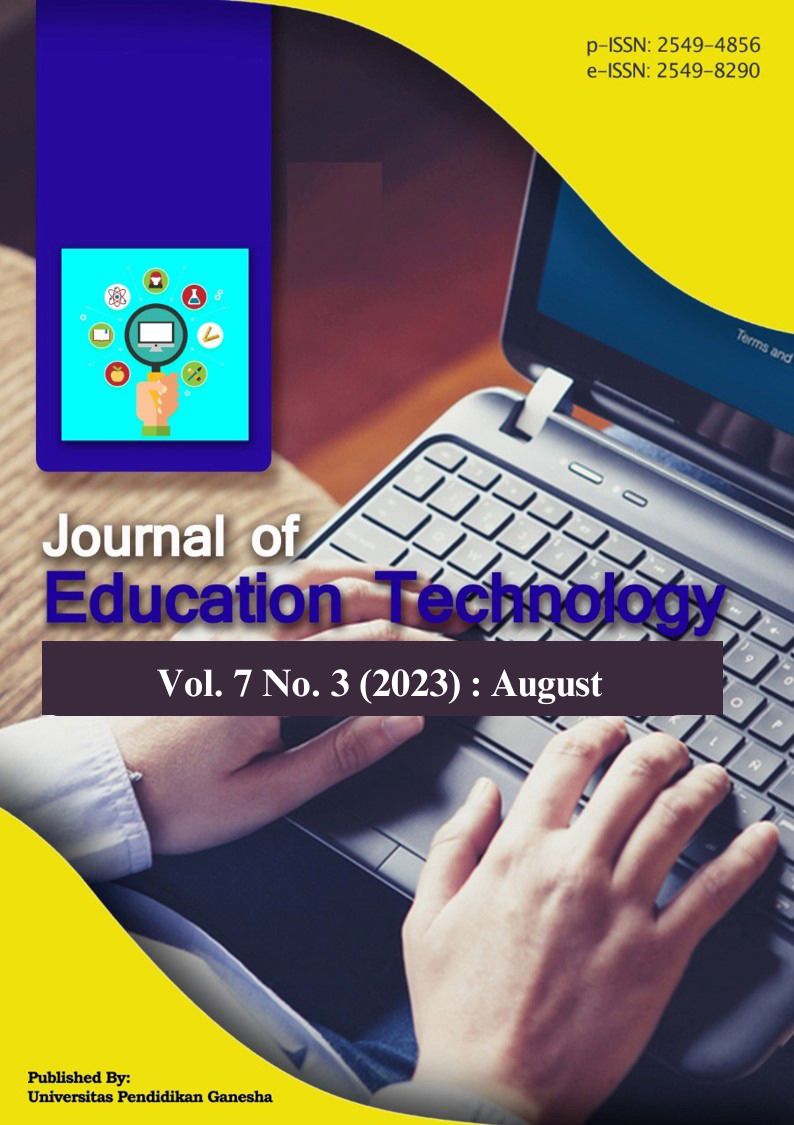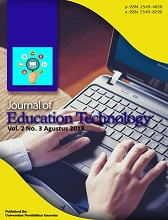Gender Differences in Teachers' Digital Literacy Skills in Teaching STEAM
DOI:
https://doi.org/10.23887/jet.v7i3.66847Kata Kunci:
Digital Literacy Skill, STEAM, Gender DifferencesAbstrak
Teachers’ characteristics such as educational level, age, gender, educational experience and digiyal literacy for educational purposes can influence the adoption of an innovation in teaching. This study aimed at analyzing the impact of gender differences on teachers' digital literacy skills in the teaching of STEAM in secondary schools. This study was descriptive research which adopted a Survey type. Four research questions were raised. The population for this research comprised science teachers in Kaduna State secondary schools. A simple random sampling technique was used to select 150 senior science teachers across the three local governments. The questionnaire was designed to elicit information from the senior secondary school teachers on the impact of gender differences on teachers' digital literacy skills in teaching STEAM. Data collected was analyzed using descriptive statistics tools which include pie charts and bar chat. The findings of the study showed that the number of male secondary school teachers was higher than their female counterparts involved in the teaching of STEAM in senior secondary schools. A significant difference exists in the number of male teachers that possess laptop devices compared to their female counterpart. A higher percentage of male teachers possess more digital skills than their female counterpart, lack of school support, limited time and lack of internet access are the major factors affecting the use of digital skills in teaching STEAM. This study recommends that schools should provide the needed facilities required in teaching STEAM based on global best practices.
Referensi
Abderrahim, E. M., Mohamed, E., & Azeddine, N. (2013). An Evaluation Model of Digital Educational Resources. International Journal of Emerging Technologies in Learning, 8(2). https://core.ac.uk/download/pdf/234940265.pdf.
Al Shammari, M. H. (2021). Devices and Platforms Used in Emergency Remote Learning and Teaching During Covid-19: A Case of English Major Students in Saudi Arabia. Arab World English Journal (AWEJ, 1, 80–94. https://doi.org/10.24093/awej/covid.6.
Alhalafawy, W. S., & Zaki. (2019). MZTThe Effect of Mobile Digital Content Applications Based on Gamification in the Development of Psychological Well-Being. International Journal of Interactive Mobile Technologies, 13(8). https://doi.org/10.3991/ijim.v13i08.10725.
Araka, E., Maina, E., Gitonga, R., Oboko, R., & Kihoro, J. (2021). University students’ perception on the usefulness of learning management system features in promoting self-regulated learning in online learning. International Journal of Education and Development Using Information and Communication Technology (IJEDICT, 17(1), 45–64. http://erepository.uonbi.ac.ke/handle/.
Ashaver, D. (2013). The Use of Audio-Visual Materials in the Teaching and Learning Processes in Colleges of Education in Benue State-Nigeria. IOSR Journal of Research & Method in Education (IOSRJRME), 1(6), 44–55. https://doi.org/10.9790/7388-0164455.
Badaru, K. A., & Adu, E. O. (2022). Platformisation of Education: An Analysis of South African Universities’ Learning Management Systems. Research in Social Sciences and Technology, 7(2), 66–86. https://doi.org/10.46303/ressat.2022.10.
Bai, J., Zhang, H., Chen, Q., Cheng, X., & Zhou, Y. (2022). Technical Supports and Emotional Design in Digital Picture Books for Children: A Review. Procedia Computer Science, 201, 174–180. https://doi.org/https://doi.org/10.1016/j.procs.2022.03.025.
Baran, E., Correia, A. P., & Thompson, A. (2011). Transforming online teaching practice: Critical analysis of the literature on the roles and competencies of online teachers. Distance Education, 32(3), 421–439. https://doi.org/10.1080/01587919.2011.610293.
Barton, M. A., Lall, M. D., Johnston, M. M., Lu, D. W., Nelson, L. S., Bilimoria, K. Y., & Reisdorff, E. J. (2022). Reliability and validity support for an abbreviated Copenhagen burnout inventory using exploratory and confirmatory factor analysis. Journal of the American College of Emergency Physicians Open, 3(4), 1–19. https://doi.org/10.1002/emp2.12797.
Cahyani, N. L. P., & Jayanta, I. N. L. (2021). Digital Literacy-Based Learning Video on the Topic of Natural Resources and Technology for Grade IV Elementary School. Jurnal Ilmiah Sekolah Dasar, 5(3), 538. https://doi.org/10.23887/jisd.v5i3.37918.
Dudek, J., & Heiser, R. (2017). Elements, principles, and critical inquiry for identity-centered design of online environments. Journal of Distance Education, 32(2), 1–18. https://search.proquest.com/openview/36da03443bbbdec42efcb9d7d1ceb2d8/1?pq-origsite=gscholar&cbl=446313.
Falloon, G. (2020). From digital literacy to digital competence: the teacher digital competency (TDC) framework. Educational Technology Research and Development, 68(5), 2449–2472. https://doi.org/10.1007/s11423-020-09767-4.
Haleem, A., Javaid, M., Qadri, M. A., & Suman, R. (2022). Understanding the role of digital technologies in education: A review. Sustainable Operations and Computers, 3(February), 275–285. https://doi.org/10.1016/j.susoc.2022.05.004.
Hobbs, R., Donnelly, K., Friesem, J., & Moen, M. (2013). Learning to Engage: How Positive Attitudes about the News, Media Literacy, and Video Production Contribute to Adolescent Civic Engagement. In Educational Media International (Vol. 50, Issue 4, pp. 231–246). Routledge. https://doi.org/10.1080/09523987.2013.862364.
Kergroach, S. (2017). Industry 4.0: New challenges and opportunities for the labour market. Foresight and STI Governance, 11(4), 6–8. https://doi.org/10.17323/2500-2597.2017.4.6.8.
Lee, L.-H., Braud, T., Zhou, P., Wang, L., Xu, D., Lin, Z., Kumar, A., Bermejo, C., & Hui, P. (2021). All One Needs to Know about Metaverse: A Complete Survey on Technological Singularity, Virtual Ecosystem, and Research Agenda. ArXiv Preprint. https://doi.org/10.48550/arXiv.2110.05352.
Lenz, C., Gebauer, B., Hladschik, P., Rus, C., & Valianatos, A. (2022). Reference framework of competences for democratic culture: Teacher reflection tool. Council of Europe Publishing.
List, A. (2019). Defining digital literacy development: An examination of pre-service teachers’ beliefs. Computers & Education, 138, 146–158. https://doi.org/10.1016/j.compedu.2019.03.009.
Mahdum, M., Hadriana, H., & Safriyanti, M. (2019). Exploring Teacher Perceptions and Motivations to ICT Use in Learning Activities in Indonesia. Journal of Information Technology Education: Research, 18, 293–317. https://doi.org/10.28945/4366.
Makarova, E. A., & Makarova, E. L. (2018). Blending pedagogy and digital technology to transform educational environment. International Journal of Cognitive Research in Science, Engineering and Education, 6(2), 57–65. https://doi.org/10.5937/ijcrsee1802057M.
Maureen, I. Y., van der Meij, H., & de Jong, T. (2018). Supporting Literacy and Digital Literacy Development in Early Childhood Education Using Storytelling Activities. International Journal of Early Childhood, 50(3), 371–389. https://doi.org/10.1007/s13158-018-0230-z.
Menggo, S., Midun, H., & Pandor, P. (2021). Students’ Digital Literacy Competence and English Study Habits. The 1st International Conference on Education, Humanities, Health, and Agriculture. https://doi.org/10.4108/eai.3-6-2021.2310655.
Morgan, H. (2022). Conducting a Qualitative Document Analysis. The Qualitative Report, 27(1), 64–77. https://doi.org/10.46743/2160-3715/2022.5044.
Morrar, R., Arman, H., & Mousa, S. (2017). The fourth industrial revolution (Industry 4.0): A social innovation perspective. Technology Innovation Management Review, 7(11), 12–20. https://timreview.ca/sites/default/files/Issue_PDF/TIMReview_November2017.pdf#page=12.
Okoye, M. D. (2014). Authentic Assessment and Evaluation: Paramount Means for the Maximization of Teaching and Learning. Journal of Educational and Social Research, 4(7), 31–40. https://doi.org/10.5901/jesr.2014.v4n7p31.
Olorundare, A. S. (2014). Learning difficulties in science education: An analysis of the current status and trends. KWASU International Journal of Education, 1(1), 1–12. https://www.academia.edu/download/61616747/OGUNLEYE_2019_KIU_141141-15420191227-79546-hi21jm.pdf.
Onasanya, S. A., Shehu, R. A., Ogunlade, O. O., & Adefuye, A. L. (2011). Teacher’s awareness and extent of utilization of information communication technologies for effective science and health education in Nigeria. Singapore Journal of Scientific Research, 1(1), 49–58. https://journals.co.za/doi/abs/10.10520/EJC135757.
Ong, C. S., & Lai, J. Y. (2006). Gender differences in perceptions and relationships among dominants of e-learning acceptance. Computers in Human Behavior, 22(5), 816–829. https://doi.org/10.1016/j.chb.2004.03.006.
Parkes, M., Stein, S., & Reading, C. (2015). Student preparedness for university e-learning environments. Internet and Higher Education, 25, 1–10. https://doi.org/10.1016/j.iheduc.2014.10.002.
Samerkhanova, E. K., & Imzharova, Z. U. (2018). Organizational and pedagogical conditions for forming the readiness of future teachers for project activities in the context of Digitalization of education. Vestnik of Minin University, 6(2). https://doi.org/10.26795/2307-1281-2018-6-2-2.
Schlegel, E. C., Tate, J. A., Pickler, R. H., & Smith, L. H. (2021). Practical strategies for qualitative inquiry in a virtual world. Journal of Advanced Nursing, 77(10), 4035–4044. https://doi.org/10.29173/iasl7898.
Seixas, B. V., Smith, N., & Mitton, C. (2018). The qualitative descriptive approach in international comparative studies: Using online qualitative surveys. International Journal of Health Policy and Management, 7(9), 778–781. https://doi.org/10.15171/ijhpm.2017.142.
Shopova, T. (2014). Digital literacy of students and its improvement at the university. Journal on Efficiency and Responsibility in Education and Science, 7(2), 26–32. https://doi.org/10.7160/eriesj.2014.070201.
Tschand, M., Mayer, B., & Sorkoa, S. R. (2020). An interdisciplinary digital learning and research factory: The Smart Production Lab. Procedia Manufacturing, 45, 491–496. https://doi.org/10.1016/j.promfg.2020.04.061.
Vartiainen, H., Pöllänen, S., & Liljeström, A. (2016). Designing Connected Learning: Emerging learning systems in a craft teacher education course. Design And, 21(2), 32–40. https://ojs.lboro.ac.uk/DATE/article/download/2115/2281.
Wang, H., Buzzetto- Hollywood, N., Elobeid, M., & Elobaid, M. (2018). Addressing Information Literacy and the Digital Divide in Higher Education. Interdisciplinary Journal of E-Skills and Lifelong Learning, 14, 077–093. https://doi.org/10.28945/4029.
Zandkarimi., Y. (2013). The Impact of E-learning on some Psychological Dimensions and Academic Achievement. International Journal of Education and Learning, 2(2), 49–56. https://doi.org/10.14257/ijel.2013.2.2.05.
Unduhan
Diterbitkan
Cara Mengutip
Terbitan
Bagian
Lisensi
Hak Cipta (c) 2023 Moses Adeleke Adeoye

Artikel ini berlisensiCreative Commons Attribution-ShareAlike 4.0 International License.
Authors who publish with the Journal of Education Technology agree to the following terms:
- Authors retain copyright and grant the journal the right of first publication with the work simultaneously licensed under a Creative Commons Attribution License (CC BY-SA 4.0) that allows others to share the work with an acknowledgment of the work's authorship and initial publication in this journal.
- Authors are able to enter into separate, additional contractual arrangements for the non-exclusive distribution of the journal's published version of the work (e.g., post it to an institutional repository or publish it in a book), with an acknowledgment of its initial publication in this journal.
- Authors are permitted and encouraged to post their work online (e.g., in institutional repositories or on their website) prior to and during the submission process, as it can lead to productive exchanges, as well as earlier and greater citation of published work. (See The Effect of Open Access)


















